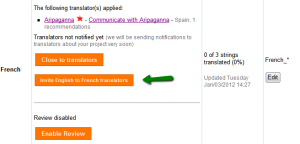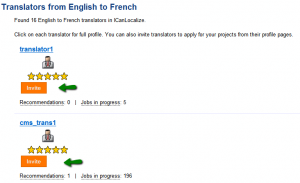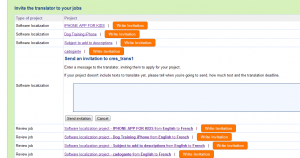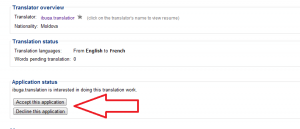You will find below a few tips that will help you locate the right translator that will best answer your needs.
About Our Translators
ICanLocalize thoroughly checks all applications from translators to ensure we only work with true professionals who hold translation degrees for their working languages. ICanLocalize translators are allowed to translate ONLY into their native language.
You will find below a few tips that will help you find the right translator that will best meet your needs.
Check applicants’ profiles
Fields of expertise
Make sure that the translator is familiar with the field of expertise your localization project requires. In website projects, you can pick a complex paragraph from your project (about 300 words) and ask for a sample translation.
Check translator’s nationality
One language can be spoken in several countries, but they all have variations. Spanish spoken in Spain is not the same as the one spoken in Latin America. Thus, make sure you know which audience you want to address to choose the right translator from the corresponding country.
Check availability
Before choosing a translator, make sure to check that they will be able to deliver a quality translation within your deadline or a reasonable timeline. Check for:
- Time zone
- Translation capacity per day (number of words per day according to topic, specialty, format, style, etc.)
Be realistic about deadlines. You have spent a considerable amount of time to put together your software, website, presentation content, etc. Bear in mind that our experts need a reasonable time frame to deliver quality translations.
Interview applicants
Don’t hesitate to use the chat system to ask them as many questions as you wish. Interaction and communication are two important pillars for the foundation of your localization success.
It is normal for translators to ask questions
Even translators who are very experienced will still have questions. It is better that the translator asks for clarifications than making assumptions. Tell translators that they are free to ask whenever they are not 100% sure. If your text uses special terms, it is best to explain them up-front.
How to proceed
You can create different kinds of translation projects. For instance, create a Software localization project and release to all translators (the project will be visible to all translators), or you can choose to close the project to translators and select the option to invite specific translators. Only the translators who received an invitation will be able to see the projects and apply.
Once you have clicked on the button to invite them, you will see a list of translators for the language pair selected and the field of expertise specified, if any.
Look at all the profiles within the list and choose those you feel are the best for your project/s as explained above.
When you have made your mind, try to be as precise as possible in the invitation you write, specifying topic, deadline, volume, etc, in order for translators to know whether they can take on the project or not.
Then, send your invitations and wait for applications. Once one or more translators have replied to your invitation and applied to your project, you can confirm/decline project acceptance directly from the project chat.



